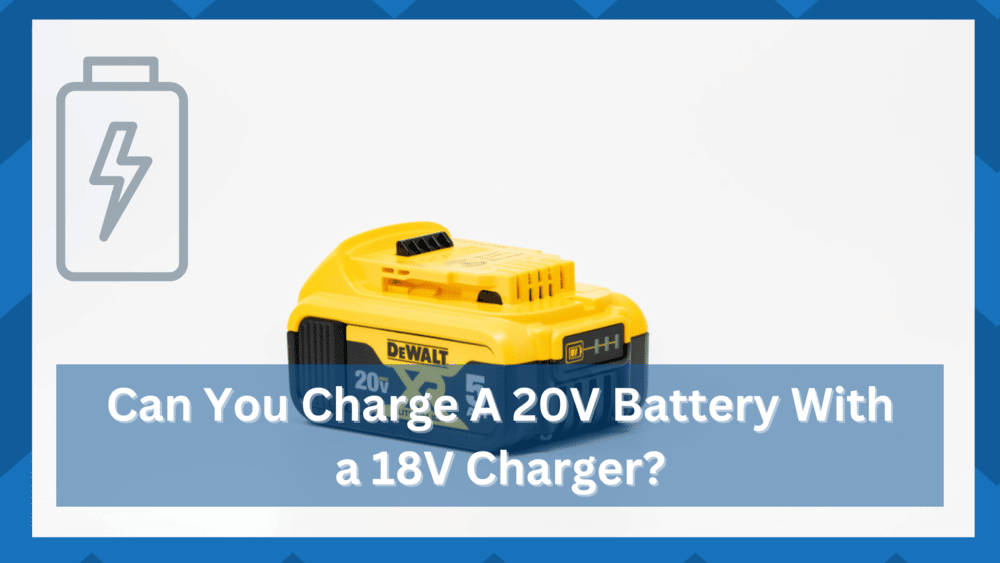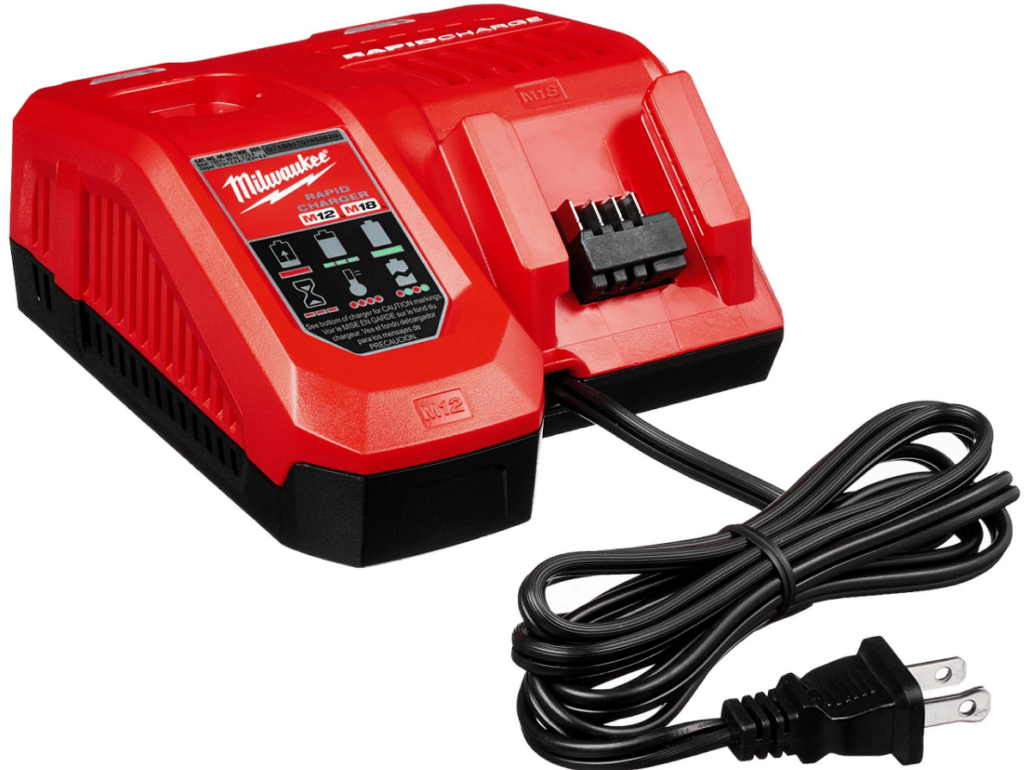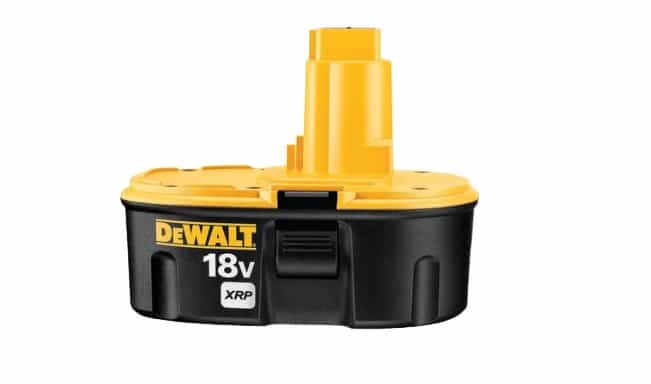
There are different batteries, and the most important thing to know about such batteries is their Voltage rating on them.
The charge is stored in voltages, and that is not something you can ignore. So, be sure to keep that in mind when you’re purchasing the right accessories for your workshop.
Similarly, you will need to charge them with the right charger that is compatible with the battery to ensure that you are not getting any problems with the battery, since not only can it cause malfunctions, but it can also be a reason for getting the battery to explode or sometimes catch fire.
While that case might be pretty rare, there is no point in risking your power tools. So, if you’re confused about a particular purchase or can’t seem to find the right fit for your house, then seeking some pointers from the local experts will serve you perfectly.
At times, you might not have the right charger on hand, and if you are wondering about charging a 20V battery on an 18V charger, here are a few things that you will need to know about it.
Can You Charge A 20V Battery With An 18V Charger?
Is it Possible?
Naturally, it is not possible for you to charge a 20V battery with an 18V charger. The charger and battery should have the same Voltage rating on them for the current to be stored on the battery efficiently without causing any problems.
The voltage rating is not something that you can ignore while you are dealing with the batteries, and you will certainly need to be careful about that.
So, be sure to only rely on the compatible option when you’re not sure about pairing an 18V charger with a 20V charger.
This confusion among owners stems from the fact that the latest models from all of the major brands can support a wide range of batteries. So, you can easily pair up a 20V charger with all of the batteries that are lower than this effective range.
This means that if you didn’t upgrade your battery and you’re working with an 18V battery with a 20V charger, then there is nothing to worry about.
The charger will be able to easily charge the 18V battery, and some owners even find it to be a quick solution.
However, that doesn’t mitigate the fact that some of the older batteries will deteriorate more quickly when you’re not using them with the right type of charger.
So, it all comes down to how you’re planning on addressing the situation.
If you’re lucky, keeping track of these pointers will come fairly easily to you. However, if you seem to be confused and can’t decide, just ask the local experts.
There is no point in guessing the right fit for your house, and seeking help from locals is never a bad idea.
Technically, it is not possible directly, but you do get some workarounds for this that can help you make it work for it. That is why you will need to ensure that you conduct a thorough study to ensure you are getting the right deal.
Hopefully, you will not have to worry about any issues when going with a compatible charger, and the best thing for you is to make the investment.
Trying to go cheap on crucial accessories will only hold you back in the long run. So, save up on some cash and get a better charger for your workshop.
You will not be disappointed with this decision and will thank yourself for the purchase in due time.
How to Achieve This?
While it is recommended to use the 20V charger to charge an 18V battery, at times, you might not be able to get your hands on such a charger in time. Sadly, that will greatly hinder the efficiency of your project as you try to secure a good enough response.
So, you might want to make the 18V charger work, or if you have all the other batteries at 18V, it might be a hassle for you to carry a 20V charger along with your equipment for just a single battery.
However, you’re not left with many options, and you will have to bear with this hassle.
Yet, certain solutions can help you out in getting rid of such problems, and an adapter that converts the voltage level is the best one among them all.
It is pretty simple to use, and you just need to plug it in on your charger, and that should be enough to get the job done for you.
There is not much that you will have to worry about and all you will need to do is make sure that you are getting the right adapter.
Since your charger is 18V and the battery is 20V, you will need to get an 18V to 20V adapter and connect it properly to the charger to make it work.
Always make sure that you are getting the 18V to 20V adapter and not the other way around since it will not work, and you will still find yourself in a fix trying to make it all work for any needs that you might be having for charging your batteries.
Compatibility Issues
With the upgrade in most battery packs to the 20V, the brands launched 20V chargers along with these packs to keep the performance optimal from the charging side of things.
These new chargers didn’t only support the 20V battery but also provided a decent platform for the 18V charger.
This means that with a 20V charger, you will not have to worry about a single thing. The charger will work perfectly, and the performance will be more than optimal as you’re trying to adjust the system.
So, even if you do decide to upgrade the battery before the charger, the performance will be optimal.
You will not feel the need to switch to any other options when you’re choosing a more robust charger with a weaker battery. However, the same can’t be said about the pairing of a weak charger with a robust battery.
The improved performance of most 20V chargers, along with their compatibility, can’t be translated into weaker units, and you will just be stuck with the system in the long run.
So, if you are planning to upgrade the battery, it is natural to upgrade the charger as well.
The pricing on most chargers is not that expensive, and we recommend that you stick with some of the more popular brands like DeWalt or Milwaukee.
There is no point in going cheap on such a crucial piece of equipment, and you will only be holding yourself back.
All that you need to do is adjust your budget or wait for a few weeks before making the purchase.
In the meanwhile, you can rely on the 18V battery to get the right performance from the power tools. Other than that, there aren’t any quick fixes or workarounds in this situation.
Next, you can also get more details from a local expert when it comes to pairing a weaker charger with a more demanding battery. He will discourage you from this action as well, and you can then get pointers on how to choose your next unit.
This is especially true if you reach out to your local dealers and have them help you with the purchase.
These experts bring years of professional experience to the table, and you will surely be sorted with some of the best options in the market. So, be sure to seek pointers accordingly.
Lastly, you can also explain your requirements to the dealer, and he will give you more perspective on which unit will match your workload.
There is no point in spending extra money on a robust system when you’re a hobbyist trying to get through some quick projects.
Wrapping Up
These were some details on whether or not it is a smart idea to pair up an 18V charger with a 20V battery.
The simple answer provided here is that you should avoid using a weak charger with a robust battery if you’re aiming to get long-term performance out of the battery.
Ignoring these pointers will only hold you back, and you will not be able to get any performance out of the unit. So, it all comes down to how you’re planning on adjusting to the situation, and these pointers will have you sorted most of the time.
The main reason behind this misconception of flexible compatibility can be linked to the fact that the newer units from established brands can support all sorts of batteries.
So, if you make the purchase on a 20V charger, it can easily support an 18V battery.
Sadly, the same can’t be said about the 18V charger, and you will only benefit from the compatibility side of things when you’re relying on the 20V charger.
Hopefully, this will be enough to nudge you in the right direction, and you will upgrade to a 20V charger for your workshop.




